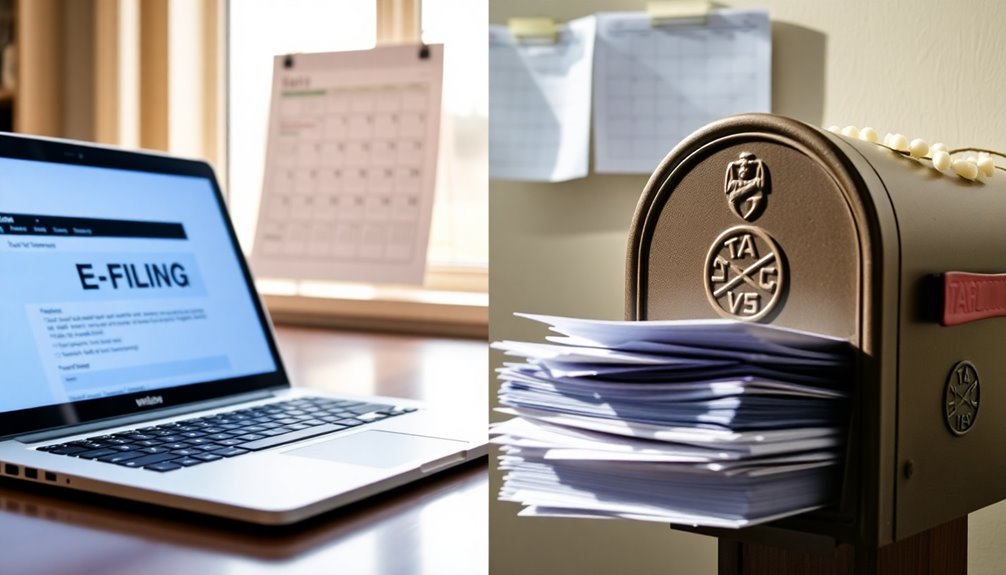You can file your taxes as early as January 15, 2025, when the IRS starts accepting federal tax returns. Getting a head start has its perks, like receiving your refund faster, usually within 21 days. Just make sure you've got all your necessary documents, like W-2s and 1099s, organized and ready. Early filing not only reduces stress but can also help you avoid last-minute mistakes. Keep in mind that state deadlines may differ, so it's smart to check local requirements too. If you want to find more tips on filing and deadlines, there's plenty more to explore!
Key Takeaways
- Tax season begins between January 20th and January 31st, and the IRS starts accepting federal returns on January 15, 2025.
- Employers must send W-2s, and businesses provide 1099s by January 31, 2025, allowing for early filing.
- Early filers can submit their returns as soon as they receive all necessary tax documents by the end of January 2024.
- E-filing allows you to file your taxes early, reducing the risk of fraud and expediting refunds.
- Requesting an extension moves the filing deadline to October 15, but it does not extend the payment deadline, which remains April 15.
Overview of Tax Season

Tax season typically kicks off between January 20th and January 31st, marking an important time for individuals and businesses alike. During this period, you'll need to gather essential documents like W-2s and 1099s to ensure a smooth filing process.
Employers are required to send W-2s to their employees by January 31, while businesses must provide Form 1099-NEC to independent contractors by the same date. Collecting all relevant financial documents before filing is crucial, as it allows you to be prepared when the IRS starts accepting tax returns. In fact, all tax forms for 2023 taxable income should arrive by the end of January 2024.
You can file your taxes electronically or by paper, but keep in mind that electronic filing is usually faster. Early filing can help you avoid the rush as well as reduce the risk of identity theft and fraudulent returns.
It also allows you to receive tax refunds more quickly or gives you extra time to arrange payment if you owe taxes. By starting the process early, you're not just keeping stress at bay; you're also managing your tax obligations more effectively.
Being proactive during tax season sets you up for success and peace of mind.
Important Dates for Filing

When it comes to filing your taxes, knowing the important dates can make all the difference in staying organized and avoiding penalties.
The tax season for 2024 kicks off on January 29, 2025, when the IRS begins accepting your federal tax returns. Make sure your employers send out W-2 forms and certain 1099s by January 31, 2025.
Mark April 15, 2025, on your calendar as it's the last day to file your individual federal income tax returns without requesting an extension. This date also serves as the deadline for IRA and HSA contributions for 2024. If you file late, you could face late filing penalties that can accrue quickly.
If you're self-employed or make estimated payments, remember these due dates: January 15, 2025, for the 4th quarter 2024 payment, and April 15, 2025, for the 1st quarter 2025 payment.
Business entities have their own deadlines, with S-Corps and partnerships due by March 15, 2025.
If you need more time, you can request a six-month extension by April 15, 2025, moving your filing deadline to October 15, 2025.
Stay on top of these dates to ensure a smooth tax filing experience!
Required Documents to File

Gathering the right documents is crucial for a smooth tax filing experience. Start by collecting your personal and identification documents.
You'll need a government-issued photo ID, Social Security cards for yourself, your spouse, and any dependents, along with their dates of birth. If applicable, include Individual Taxpayer Identification Numbers (ITIN) and Form 8332 if you're claiming a child.
Next, gather your income documents. Make sure you have Forms W-2 from each employer and any relevant Forms 1099 for other income types, such as 1099-NEC for self-employment income. Additionally, ensure you have W-2 forms from all employers required for accurate reporting.
Don't forget unemployment benefit statements and retirement income documents.
For deductions and expenses, collect Form 1098 for mortgage interest, Form 1098-E for student loan interest, and Form 1098-T for tuition.
If you're self-employed, keep records of your business expenses and estimated tax payments.
Lastly, include other relevant documents like last year's tax returns, Forms 5498 for IRA contributions, and childcare records.
Having all this paperwork ready will streamline your filing process and help you avoid any last-minute stress.
Benefits of Filing Early

Filing your taxes early offers numerous advantages that can greatly enhance your financial situation. First, you can receive a tax refund sooner. The IRS processes returns in the order they're received, so the earlier you file, the quicker you're likely to get your money back. Most refunds are issued within 21 days, which can help you pay bills, buy essential items, or boost your retirement savings.
Plus, waiting longer means your refund's value decreases due to inflation.
Additionally, early filing gives you extra time to prepare for any taxes owed. Since payments aren't due until April 15, you can budget effectively and avoid late penalties. The IRS provides various repayment options, including plans for those who can't pay in full right away. Filing early also provides you with essential financial information to prepare for significant life changes, such as home purchases or college applications.
Filing early also protects you against fraud and identity theft. By locking down your tax data sooner, you reduce the risk of someone else using your information to file a fraudulent return.
Lastly, early filing reduces stress. It allows you more time to gather documents, double-check your calculations, and understand any tax law changes, ensuring accuracy in your return.
Steps to Prepare for Filing

Preparing to file your taxes involves several essential steps to ensure a smooth process. First, gather all necessary documents. You'll need an unexpired government-issued photo ID, your Social Security card, and copies of last year's federal and state tax returns.
Don't forget income documents like W-2s, 1099s, and statements related to unemployment or retirement income.
Next, organize your income and deduction information. Categorize your income based on employment status and gather records for potential deductions, such as home office expenses and childcare costs. Early filing allows you to discover potential deductions and credits through proactive discussions with tax professionals.
Maintain detailed records of all expenses, including receipts and bank statements.
Be mindful of any life changes that may affect your filing, like a new job or a change in dependents. Document any miscellaneous income you might have, such as jury duty payments or gambling winnings.
Finally, ensure accuracy and completeness by reviewing all documents carefully. Check for math errors and verify that names and numbers are correct.
If you're unsure, consult a tax professional for guidance. Following a checklist can help you stay organized and updated on any changes before you file.
Filing Options: E-File vs. Mail

When it comes to submitting your tax return, you have two primary options: e-filing and mailing a paper return.
E-filing is available as soon as the IRS starts accepting returns, usually in late January. It's generally more accurate due to built-in checks, and most refunds hit your bank account within 21 days—sometimes even two weeks faster than with paper returns. You can use Free File software for both federal and state returns, and direct deposit makes receiving your refund a breeze. Additionally, many tax preparation companies offer tax refund loans that can provide quick cash access while you wait for your refund.
On the other hand, mailing your return involves manual preparation, which can lead to more errors and longer processing times. You'll need to sign your return and attach any supporting documents, risking loss or misplacement. Refunds from paper filings typically take longer to arrive, and you must keep physical copies for at least three years.
While e-filing offers greater efficiency and security against fraud, mailing your return can still be a viable option if you prefer traditional methods.
Ultimately, choose the method that best suits your needs and comfort level.
Understanding Tax Deadlines

Navigating tax deadlines is crucial for ensuring you meet your obligations and avoid penalties. Tax season typically begins when the IRS starts accepting federal tax returns, which is expected between January 15 and January 31, 2025. You can prepare your taxes even earlier with a tax advisor or filing software. IRS acceptance of federal tax returns will allow you to file as soon as they begin processing returns.
Keep in mind that the official start date isn't confirmed until closer to tax season.
The main deadline to file your federal tax return, known as Tax Day, is April 15, 2025. Before that, make sure you receive your W-2, 1099, and other forms by January 31, 2025, and pay any estimated taxes due by January 15, 2025.
If you need more time, you can file for an extension by April 15, 2025, but remember that this doesn't extend your time to pay taxes owed.
Also, state tax deadlines may differ from federal deadlines, and special situations, like natural disasters, can affect your filing timeline.
Missing these deadlines can lead to penalties and interest, so stay organized and aware of all important dates to keep everything on track.
Extensions and Their Implications

Filing your taxes can sometimes feel overwhelming, especially if you need more time to gather your documents or sort through complexities in your financial situation. If you find yourself in this position, requesting a tax extension can be a smart move.
You need to submit IRS Form 4868 by April 15 to get an automatic six-month extension, allowing you until October 15 to file your return. You don't have to explain why you're requesting the extension, and you can submit the form electronically or by mail. Additionally, each state has distinct requirements for tax extensions, so it's important to check your state's rules.
However, keep in mind that an extension doesn't extend your payment deadline. You must estimate and pay any federal tax owed by April 15 to avoid penalties and interest, which will accrue on any unpaid taxes.
Missing the April 15 deadline can lead to significant penalties, and if you miss the October 15 deadline, those penalties become retroactive.
While an extension gives you more time to file and potentially avoid errors, it's crucial to manage your payments responsibly to sidestep unnecessary financial issues.
State-Specific Filing Requirements

Understanding state-specific filing requirements is essential for ensuring compliance and avoiding unnecessary penalties. Each state has its own deadlines and rules, so it's crucial to familiarize yourself with them.
For instance, if you're filing in Alabama, Arizona, Arkansas, or California, mark April 18 on your calendar as the deadline. However, Delaware gives you a bit more time, with a due date of May 2.
When working as a nonresident, know that certain states require withholding if you perform services for a specific number of days. In Arizona, for example, you'll need to withhold if you work there for 60 days or more. Connecticut requires withholding after just 15 days, while Louisiana has a threshold of 25 days. Additionally, withholding is required in states like North Dakota if employment exceeds 20 days.
Filing thresholds vary too. In Alabama, if your gross income from state sources exceeds the prorated personal exemption, you must file.
Other states, like Arkansas and Iowa, require you to file if you've received income from state sources or if it exceeds $1,000. Always check local regulations, especially in states like Maryland and Nebraska, where nonresidents must file if they've income from state sources.
Tips for a Smooth Filing Process

A smooth tax filing process can make a significant difference in your overall experience during tax season. To start, staying organized throughout the year is crucial. Keep important documents like receipts, bank statements, and investment records in one accessible location. Digital tools can help you track expenses and income, and referring to last year's tax return can guide you in gathering necessary documentation.
Be mindful of major life events, such as marriage or a new job. These can affect your taxes, so consult with a tax professional to maximize your benefits and update the IRS and Social Security Administration with any changes. Additionally, it's important to maintain organized records to easily navigate any tax implications that arise from these life events.
Filing your taxes early is another smart move. The IRS typically starts accepting returns in late January, and early filing helps protect against identity theft while allowing ample time to review documents.
Finally, utilize tax preparation tools or professionals. Creating an IRS online account can simplify managing your tax documents. If your tax situation is complex, consider working with a professional to ensure accuracy.
Double-check all documents to avoid mistakes, and don't hesitate to file for an extension if needed.
Frequently Asked Questions
Can I File My Taxes Before Receiving My W-2 Forms?
You can't file your taxes accurately without your W-2 forms, as they contain crucial information about your earnings and withholdings.
If you haven't received your W-2 by January 31, reach out to your employer or HR department to request it.
If you still don't get it by the end of February, contact the IRS for a substitute form.
Gathering other documents while you wait can help you prepare for filing.
What Happens if I File My Taxes Early but Owe Money?
If you file your taxes early but owe money, you'll still have until the deadline to pay your tax bill, which helps you plan better.
Early filing gives you time to budget for the payment and avoid late penalties. You can also explore IRS payment plans if needed.
Plus, getting it done early reduces stress and gives you a chance to review your finances, ensuring you're prepared for any surprises.
Are There Penalties for Filing Taxes Too Early?
No, there aren't any penalties for filing your taxes too early.
In fact, filing early can be beneficial, as it helps protect against identity theft and allows for quicker refunds. You won't face any repercussions for submitting your return before the deadline, as long as you've included all necessary documentation.
Just make sure to check that your information is accurate to avoid complications later on. Early filing can really give you peace of mind.
Can I Amend My Tax Return After Filing Early?
Yes, you can amend your tax return after filing. If you discover any errors or omissions, use Form 1040X to make corrections.
Just make sure the IRS has processed your original return first. It's best to wait for any refund before filing the amendment.
Will Filing Early Affect My Refund Timeline?
Filing early can definitely affect your refund timeline.
If you e-file and choose direct deposit, you could see your refund within 8-15 days. On the other hand, mailing a paper return might take 4-6 weeks.
Early filing also reduces competition for IRS processing, which can lead to faster refunds.
Plus, it gives you extra time to address any potential issues and avoid delays, ensuring a smoother experience overall.
Conclusion
Filing your taxes early can save you stress and ensure you get your refund sooner. By knowing the important dates and gathering your documents in advance, you set yourself up for a smoother process. Remember to check state-specific requirements and consider filing extensions if needed. With a little preparation, you can navigate tax season with ease. So don't wait—start organizing your paperwork now and enjoy the peace of mind that comes with early filing!









